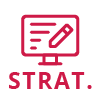
Last updated May 31, 2023
What is a sales qualified lead (SQL)?
Lewis (2012) explains that a sales qualified lead (SQL) is a lead that is labeled by the sales team as likely to be sold. The sales team then determines an expected euro value and time frame to make the sale.
How do you recognize a sales lead?
Sale qualified leads have distinct characteristics, distinguishing them from the other types of leads:
- Sales leads match your ideal customer profile. It is important to establish a good customer profile, with information about the type of business, products and services, number of employees and other characteristics. This helps tremendously in distinguishing different types of leads.
- Sales leads have an urgent problem that your products and services can solve. This urgency is very important: a customer is more likely to make a purchase if their problem needs an urgent solution.
- A sales lead is very interested in your offer. He proved that before, when he was a marketing qualified lead.
- The sales lead has enough budget to make the purchase.
- Finally, authority is an important characteristic of a sales lead. The sales qualified lead has the mandate to make decisions.
Differentiating leads
You want your marketing and sales activities to run as efficiently as possible. Chasing a lead that is not actually promising is a waste of time and money. Different leads are at different stages of the buying process and therefore require a different approach. Not every company that comes to you is a potential customer, and it's good to quickly pick out the promising leads. Then you can develop a tailored marketing and sales approach for them.
The marketing and sales process distinguishes the following leads:
- IQL: information qualified lead. A potential customer seeks information about a product or service.
- MQL: marketing qualified lead. The potential customer is interested in your product and has shown that by signing up for your newsletter, requesting information or responding several times to your online marketing campaign, for example.
- SQL: sales qualified lead. The prospect is ready to talk to sales or make a request for quotation. In principle, he is ready to make a purchase.
Differences between SQL and MQL
- The major difference between SQL and MQL is the buying intent of the prospect. Whereas with an MQL it is not yet certain whether the prospect wants to make a purchase, with SQL the prospect is ready to make a purchase.
- A prospect in SQL stage is about to make a choice, while a prospect in MQL stage shows interest but does not yet know if he wants to buy the product
- Signs of an MQL is that the prospect signs up for the newsletter, for example, and visits the website several times. Signs of a SQL is that the prospect downloads a demo of the product and reads articles such as "this you need to know before you buy."
From marketing lead to sales lead
Have you defined your lead as sales qualified lead? Then it's time to turn the lead over to the sales department. It's up to sales to tailor a sales plan, which convinces the potential customer that your offer is going to solve their problem.
A sales qualified lead (SQL) is a potential customer who has shown great interest in a product or service and is ready to start the conversation with the sales department. In the sales funnel, the sales qualified lead comes after the marketing qualified lead (MQL). That means the lead is another step further in the buying process.

To do this, the lead has already gone through several stages of the buying process: he is aware that he has a problem or issue, has started gathering information and has your product in mind as a possible solution to his problem. Mind you, as a possible solution. A qualified sales lead is still not a guaranteed customer, so it is important for the sales department to choose the right strategy to close the deal.
Resources
Lewis, D. (2012). Manufacturing Demand. New Year Publishing.
Curious about your company's growth potential?
Take the first step toward above-average growth today. Find out how we lead companies to more than 20% growth.

















 Team
Team FAQ
FAQ Prices
Prices Vacancies
Vacancies Contact
Contact Marketing
Marketing SEO
SEO SEA
SEA Strategy
Strategy Sales
Sales Optimization
Optimization AWR
AWR Ahrefs
Ahrefs Channable
Channable ContentKing
ContentKing Leadinfo
Leadinfo Optmyzr
Optmyzr Qooqie
Qooqie Hubspot
Hubspot Semrush
Semrush



